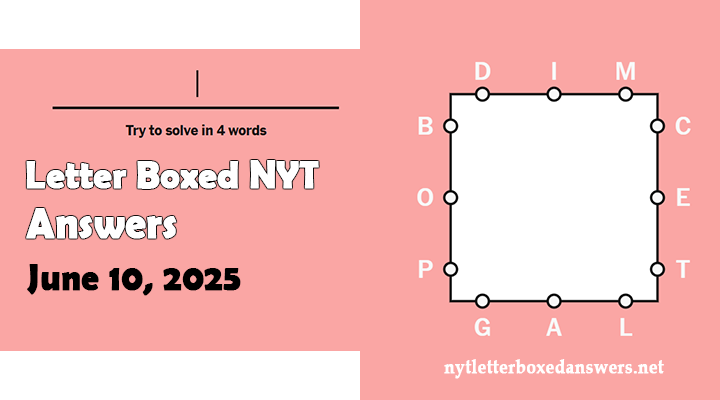NYT Letter Boxed quiz for Tuesday June 10, 2025 is released. We came up with Letter Boxed June 10 2025 Answers and Hints for you. With the help of these hints, you will be able to guess the words of letter boxed quiz without revealing the answers and get the solution.
| Top | Right | Bottom | Left |
|---|---|---|---|
| DIM | CET | GAL | BOP |
| Two Words Solution | ||
|---|---|---|
| BELEAPED | DOGMATIC | |
| BITMAP | PEDOLOGIC | |
| CAPILOTADE | ELEGIAMBIC | |
| COGITABLE | EMPLEAD | |
| Three Words Solution | ||
|---|---|---|
| ABED | DOGMATIC | CPL |
| ABIOTIC | CAMP | PLEDGED |

Word 01:
This 8-letter word starts with B and ends with D; an archaic term meaning “leaped over” or “sprang upon”.
Rarely used modern English verb.
Found in poetic or literary contexts.
Derived from prefix be- + leap.
Describes swift or sudden physical movement.
Suggests action of assault or pounce.
May imply surprise or energetic entrance.
Similar in style to words like “befell” or “beguile”.
Likely seen in historical or epic narratives.
Can be metaphorically used for abrupt encounters.
Word 02:
This 8-letter word starts with D and ends with C; means rigidly opinionated or adhering strictly to beliefs.
Often negative in tone when describing people.
Related to religious or ideological assertions.
Derived from “dogma”, meaning principle or doctrine.
Synonym of inflexible, doctrinaire.
Opposite of open-minded or flexible.
Common in political or philosophical debates.
May suggest arrogance or lack of critical thought.
Found in descriptions of authoritarian attitudes.
Can describe speech, tone, or attitude.
Word 01:
This 6-letter word starts with B and ends with P; a type of digital image format.
Common in basic graphic files like *.bmp.
Made of pixels stored in a grid.
Uncompressed, leading to larger file sizes.
Simple structure, easy to manipulate in programming.
Contrasts with vector images.
Often used in older software or OS components.
Can be opened with basic image viewers.
Good for detailed images with few colors.
Basis of many early Windows graphics.
Word 02:
This 9-letter word starts with P and ends with C; relates to the study of soils.
Comes from pedology, the science of soil formation.
Used in environmental, agricultural, and geological fields.
May involve classification and mapping.
Covers soil horizons, texture, and pH.
Important for crop production and land use planning.
Rooted in Greek “pedon” (soil) and “logos” (study).
May appear in academic journals or environmental reports.
Differs from child psychology despite similar roots.
Closely tied to geomorphology and hydrology.
Word 01:
This 10-letter word starts with C and ends with E; a stew made of leftovers, especially meat and sauce.
French culinary origin.
Often includes shredded poultry with wine or vinegar.
Rich in seasoning and reduced broth.
Related to resourceful cooking from scraps.
Can be made with turkey, chicken, or fish.
Sometimes topped with croutons or eggs.
Historical dish in European cuisines.
Still served in traditional French households.
Combines cooking terms capilotade and ragoût.
Word 02:
This 10-letter word starts with E and ends with C; describes a poetic meter combining elegiac and iambic elements.
Rooted in classical Latin and Greek verse.
Common in ancient epigrams or lamentations.
Used to alternate long and short poetic lines.
Combines mournful and rhythmic tones.
May describe a dual meter pattern.
Found in scholarly or academic poetry discussions.
Related to dactylic hexameter and iambic trimeter.
Very rare outside of classical studies.
Suitable for formal verse analysis.
Word 01:
This 9-letter word starts with C and ends with E; something that can be thought of or conceived.
Derived from Latin cogitare meaning “to think”.
Philosophical term regarding mental constructs.
Can refer to potential ideas or concepts.
Opposite of unthinkable or unimaginable.
Used in metaphysics or logic contexts.
May refer to intellectually graspable things.
Rare in everyday conversation.
Fits with terms like “cogitation” and “cogitative”.
Highlights abstract mental capability.
Word 02:
This 7-letter word starts with E and ends with D; an archaic legal term meaning “to prosecute” or “to sue”.
Found in early English or legal texts.
Derived from Anglo-French empleder.
Related to formal legal action.
Now replaced by modern legal vocabulary.
Could be seen in medieval law records.
Connected to initiating court proceedings.
Not to be confused with “employed”.
May appear in Shakespearean or historical works.
Associated with civil or royal court disputes.
Word 01:
This 4-letter word starts with A and ends with D; means lying in bed or confined to bed.
Found in older literature or poetic diction.
Often implies illness or sleep.
Used in contrast to being awake or active.
Associated with nighttime or rest.
Obsolete in most modern usage.
Still appears in certain idioms or scriptures.
Similar in style to words like afield, abroad.
Suggests passivity or restfulness.
Short and stylistically old-fashioned.
Word 02:
This 8-letter word starts with D and ends with C; means rigidly opinionated or adhering strictly to beliefs.
Often negative in tone when describing people.
Related to religious or ideological assertions.
Derived from “dogma”, meaning principle or doctrine.
Synonym of inflexible, doctrinaire.
Opposite of open-minded or flexible.
Common in political or philosophical debates.
May suggest arrogance or lack of critical thought.
Found in descriptions of authoritarian attitudes.
Can describe speech, tone, or attitude.
Word 03:
This 3-letter word starts with C and ends with L; abbreviation for a military rank or a shorthand for “couple”.
Stands for Corporal in army and marine forces.
Commonly appears on ID tags and rank charts.
Also used as short form for “couple” in texting.
Sometimes seen in job titles or military resumes.
Rank positioned below Sergeant.
Used in both British and U.S. military contexts.
May represent “Commercial Pilot License” in aviation.
Seen in shorthand communication or forms.
Can appear in video game rankings or scoreboards.
Word 01:
This 7-letter word starts with A and ends with C; refers to non-living components in an ecosystem.
Contrasts with biotic factors like plants or animals.
Includes elements like sunlight, temperature, and soil.
Common term in biology, ecology, and environmental science.
Affects the growth and survival of organisms.
Prefix “a-” means “without”, and “biotic” relates to life.
Influences biomes and habitat conditions.
Used in scientific research and ecological reports.
Can determine species distribution and adaptation.
Often paired with “biotic” in environmental models.
Word 02:
This 4-letter word starts with C and ends with P; a temporary place to live, often outdoors.
Common in summer programs, military training, or hiking.
Can be a verb meaning to set up a tent or base.
Frequently associated with bonfires, tents, and cabins.
Also refers to a group sharing beliefs or goals (e.g., political camps).
Used in phrases like “boot camp” or “campground”.
Can describe theatrical, exaggerated style in art or fashion.
Related to camping gear, nature, and travel.
Symbolic of adventure and outdoor education.
May be permanent (like refugee camps) or recreational.
Word 03:
This 7-letter word starts with P and ends with D; committed to a promise or obligation.
Often involves giving one’s word or vow.
Common in fundraising or charitable contexts.
Used in formal oaths or fraternity initiation.
Can mean promised money or support.
May refer to a loan guarantee using collateral.
Appears in legal, financial, and ceremonial language.
Also describes entering into a binding agreement.
Related to honor, duty, or loyalty.
Seen in political speeches and loyalty statements.

Chris Brown is a passionate word game love and problem solving expert. With over 15 years of experience in solving puzzle challenges, he provides daily NYT Letter Boxed answers, tips and strategies to help other players so that they can improve their solving skills. Whether you are stuck on a tricky puzzle or looking for new techniques, Chris is here to guide you with his expert solutions.